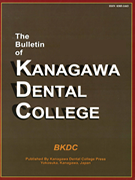- HOME
- > 一般の方
- > バックナンバー:The Bulletin of Kanagawa Dental College
- > 25巻2号
- > アブストラクト
アブストラクト(25巻2号:The Bulletin of Kanagawa Dental College)

English
| Title : | Cell-Cell / Cell-Matrix Interactions in Tumor Invasion and Metastasis |
|---|---|
| Subtitle : | BKDC CLINICAL AND RESEARCH TOPICS : Adhesion Molecule |
| Authors : | Yasumasa Kato, Shigeru Saito, Shinri Koshika |
| Authors(kana) : | |
| Organization : | Department of Oral Biochemistry, Kanagawa Dental College |
| Journal : | The Bulletin of Kanagawa Dental College |
| Volume : | 25 |
| Number : | 2 |
| Page : | 115-123 |
| Year/Month : | 1997 / 9 |
| Article : | Report |
| Publisher : | Kanagawa Odontological Society |
| Abstract : | [Abstract] Cell-surface-associated adhesion molecules have been shown to be concerned with cell attachment, cell motility, and degradation of extracellular matrix. Loss of cell-cell adhesion causes the detachment of tumor cells from the primary site. The expression of a specific receptor for the extracellular matrix induces the adherence of tumor cells to the vessels as a result of increased cell affinity to the basement membrane in the target organ. The acquision of extracellular matrix degrading activity facilitates tumor invasion and extravasation into the lymphatic or blood vessels through the basement membrane. The increased ability of cell motility also contributes to the success of tumor metastasis. Thus, the adhesion molecules are one of the key factors in tumor metastasis. The development of metastasis is dependent on the interaction between the host factor and the intrinsic characteristics of malignant tumor cells. Because tumors are predominantly heterogeneous, they contain a variety of subpopulations of the cell associated with differing metastatic potential. In this review, we discuss the multi-functional action of adhesion molecules on tumor invasion and metastasis. |
| Practice : | Dentistry |
| Keywords : | Adhesion molecules, Extracellular matrix, Matrix metalloproteinases, Trypsin, Motility |
